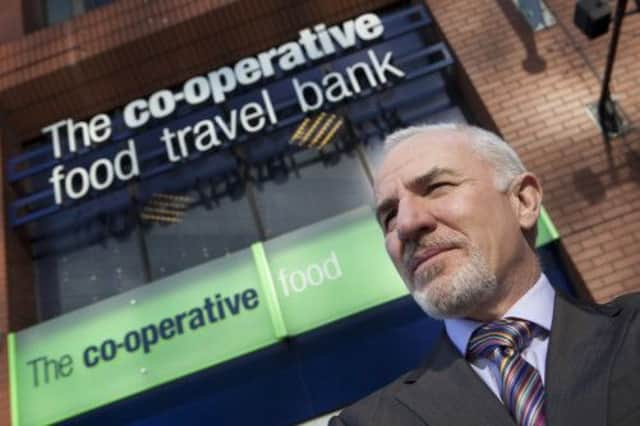Co-op’s bank will not make a profit for years


The Co-op also confirmed that it could take four years to sort out the bank’s problems, and the changes would involve job cuts among its 10,000 staff.
Euan Sutherland, who became the Co-operative Group’s chief executive in May, said: “We think there will be an impact on jobs, but we’re not in a position to put any details on that.”
Advertisement
Hide AdAdvertisement
Hide AdMr Sutherland apologised to investors and customers, and added: “We are a new team and are grasping the nettle and getting on with fixing the situation.”
The Co-operative Group has strong historic links with Yorkshire, and there will be fears that any planned job cuts could harm the region’s economy. Altogether, the group employs 7,600 people in Yorkshire. The Co-operative Group was created from the merger of the Co-operative Group and United Co-operatives in 2007.
United Co-operatives was formed in 2002 through the merger of Yorkshire Co-operatives and United Norwest Co-operatives.
Two of Yorkshire’s oldest co-operative societies – Sheffield and Leeds – merged with United in early 2007. The Co-operative bank yesterday slashed the value of its loans with a £496m impairment charge.
Advertisement
Hide AdAdvertisement
Hide AdSoured corporate loans, many of which were acquired with its disastrous takeover of Britannia Building Society in 2009, were behind £434m of the writedowns.
And the lender, which styles itself as the ethical alternative to major names, is drawing up a blueprint to squeeze costs. The bank, part of the wider customer-owned Co-operative Group, also revealed its core tier one capital ratio – a key measure of financial strength – has slumped to 4.9 per cent from 8.8 per cent a year earlier. It expects this to improve to between seven per cent and nine per cent by the end of the year under plans to plug a £1.5bn black hole in its finances.
The scale of the bank’s woes was unveiled as its new management, led by former HSBC director Niall Booker, attempts to recover from a catalogue of problems following the Britannia deal. The bank warned it will not be a “going concern” if the £1.5bn plan – which will force losses on bondholders – flops.
The Co-op added it does not expect the bank to turn a profit for “some years”. The lender, which has 4.7 million customers, wrote down £148.4m on a new IT system, which had been planned by former management under an ambitious growth strategy.
Advertisement
Hide AdAdvertisement
Hide AdThe replacement computer system was designed for a “much bigger institution”, but the Co-op said it does not suit its future needs as a much smaller lender.
Its humbling pre-tax losses are a far cry from earlier this year, when the bank harboured ambitions to join the “premier league of UK banking” by acquiring more than 600 branches from Lloyds Banking Group. But in May it was hit by a ratings downgrade and forced to abandon the branch deal.
In June it announced painful plans to plug a £1.5bn capital gap – after City watchdog the Prudential Regulation Authority flagged concerns over its capital buffers.
It involves the Co-op selling its insurance businesses and raising new money from investors to fund £1bn of that. The remaining £500m will come from bondholders, who will be forced to take a hit on their investment and offered shares in the bank in return.
Advertisement
Hide AdAdvertisement
Hide AdThe group said it considered all the options – believed to include a taxpayer bailout of the bank – but its plan is “fair” and in the “long-term interests of all stakeholders”.
The bank has been carved into core and non-core divisions, comprising £17bn and £15bn of assets respectively. The Co-op said it has taken a tougher approach to impairments, while classing more loans as non-core, resulting in the higher writedowns. The non-core business, now called Co-operative Asset Management, will be wound down or sold off in time.
During the first half of the year, the bank also accessed £900m from the Bank of England’s Funding for Lending Scheme, which offers discounted loans in return for boosting lending.
It extended £1.6bn of new loans during the first half, with 45 per cent of this going to home buyers. It also lent £500m to businesses, down from £700m a year earlier, after stopping lending to big companies to focus on loans to small and medium-sized firms.
Advertisement
Hide AdAdvertisement
Hide AdIn response to the Co-operative Bank’s results, a Bank of England spokesman said: “The Prudential Regulation Authority (PRA) anticipated the likely scale and source of these losses when it made its assessment of the bank’s capital position in June.
“The announcement today does not affect the PRA’s assessment that the Co-operative Bank has a capital shortfall of £1.5bn, relative to seven per cent core equity capital, after adjustments.”